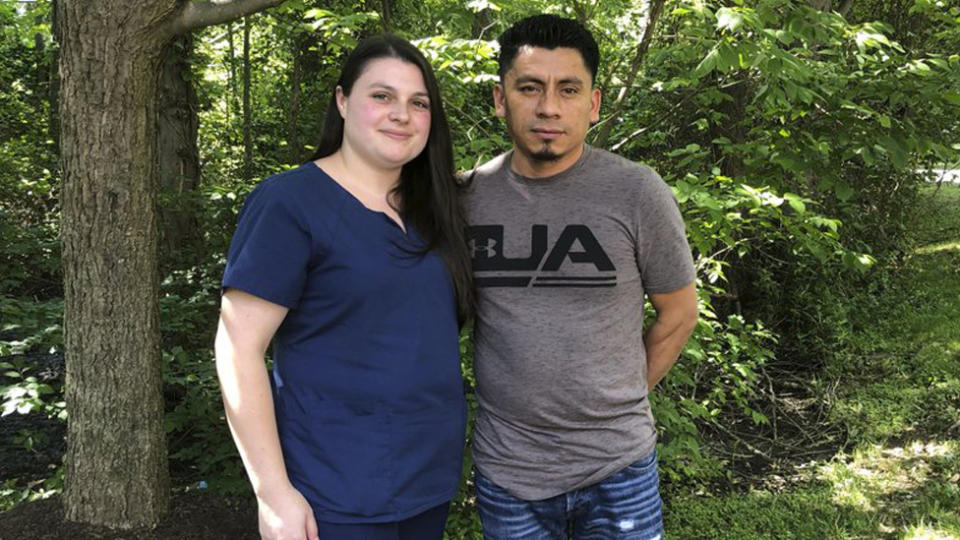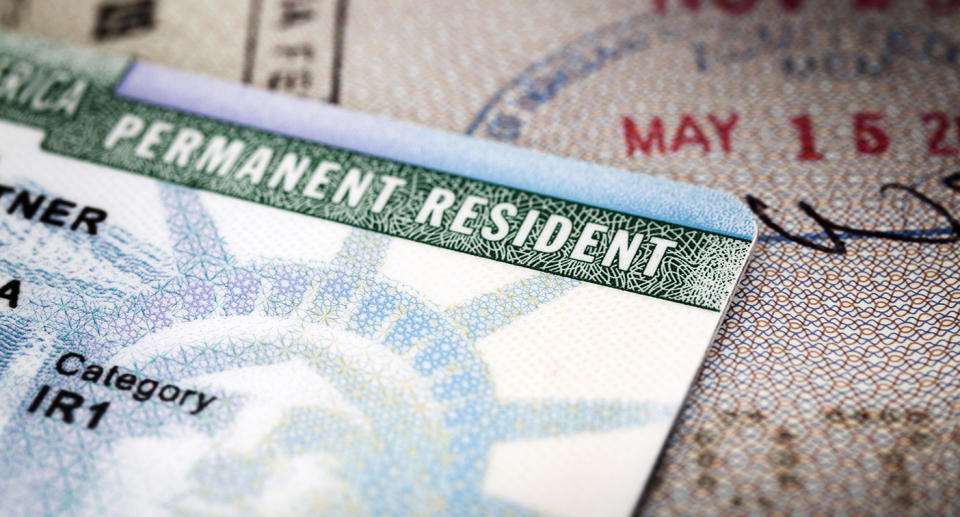'It was a trap': Cruel twist in couple's 'green card' interview
Alyse and Elmer Sanchez were thrilled when they survived their “green card” interview, a crucial step in obtaining lawful status in the United States, but moments later one of them was in handcuffs.
As soon as the the immigration officer had agree that their marriage was legitimate, Alyse sent a text to her family to share the good news.
Moments later, Elmer was detained pending deportation to his native Honduras, leaving her alone with their two young boys.
“We feel it was a trap, a trick, to get us there,” Alyse said.
The Sanchezes have joined five other couples in a class action accusing federal agents of luring families to marriage interviews in Baltimore, in the US state of Maryland, only to detain the immigrant spouse for deportation.
Federal regulations allow US citizens like Alyse to try to legalise the status of spouses like Elmer, who has been living in the country illegally.
Records show the US Citizenship and Immigration Services approved 23,253 provisional unlawful presence waivers, the final documents spouses, children or parents of citizens need before leaving the country and applying to rejoin their families legally.
But the American Civil Liberties Union (ACLU) said a growing number of officers have “cruelly twisted” the rules by detaining immigrant spouses following marriage interviews.

The ACLU is pursuing a similar complaint in Massachusetts and says dozens of detentions also have happened at field offices in New York, Virginia, Florida, Illinois and California.
The Maryland case is assigned to US District Judge George J. Hazel, who already reversed the deportation of a Chinese man, Wanrong Lin, detained after a successful marriage interview in the state.
Ruling just before Lin landed in Shanghai last November, Hazel said the government can’t use the process “as a honeypot to trap undocumented immigrants who seek to take advantage of its protections”.
Alyse told The Associated Press her family’s life “just seemed so perfect”.
She and Elmer, now 31 and 41, began dating in 2013, after he bought a car from her and they married that year.
The couple have two sons, 4 and 2, and live in the suburb of Kensington, Maryland, where Elmer owns a home remodelling company while Alyse works at a veterinary clinic.
“Everyone has their ups and downs in their relationships but ours has been pretty smooth,” she said.
”He’s been there for every important event in my life, he’s been the most important event in my life.”

The Sanchezes were nervous but hopeful as they told their interviewer how they met and answered questions.
At the officer’s request, Alyse spoke with her husband in Spanish, on camera.
The interviewer confirmed their bona fides and said Alyse would get the formal approval in the mail the next day but said his supervisor “had to come and authenticate the case”, according to the lawsuit.
Alyse was told to leave the room, minutes later, their lawyer told her Elmer had been detained, leaving her sobbing in the hallway.
Six chaotic weeks followed as Elmer was shuffled around detention facilities while Alyse sought counselling and tried to console their four-year-old son, who constantly asked about his dad.
Court records show Elmer had been ordered to be deported in 2005, after missing an immigration hearing he said he was never notified of.
After consulting with lawyers, Alyse submitted paperwork to get her husband a green card in September 2018.
According to the lawsuit, the notice for the May 7 appointment said the required interview was “solely to confirm the bona fides of the couple’s marriage”.
Obama-era regulations provide for this, even for people with deportation orders, although it’s a process that can take months.
The couples are first required to demonstrate the legitimacy of their marriage in the initial interview, and then earn other approvals.
Immigrant spouses must then travel abroad for a visa interview at a US consulate, only able to return legally if they receive a visa.
It’s unclear how many individuals have successfully become permanent US residents through the process.
The ACLU said this process facilitates a proper record for families with mixed citizenship, and it’s meant “to avoid the grievous consequences of forcing a spouse or parent to leave” the US for years while trying to build a lawful immigration case from their home countries.
The plaintiffs said the US Department of Homeland Security is unlawfully using the process as bait, ACLU of Maryland attorney Nick Steiner said it began in 2017 and seems to happen randomly nationwide.
“Previous practice would allow immigration lawyers to bring their clients to their interviews without fear of arrest because there was an understanding that they were trying to receive Green Cards, notwithstanding the removal orders, and there’s also longstanding guidance that USCIS should be following, that prohibits arrests at interviews,” he said in an email.

The Homeland Security agencies said they don’t comment on pending litigation but depositions and emails released in the Massachusetts case suggest federal officials were coordinating to target immigrant spouses at their marriage interviews.
“In my opinion, it makes sense for us to arrest aliens with final removal orders as they represent the end of the line in the removal process,” wrote Andrew Graham, a Boston-based ICE officer.
“They are typically the easiest to remove, they have the shortest average length of stay, and at the end of the day we are in the removal business and it’s our job to locate and arrest them.”
The government in its response to the complaint filed in Maryland argued the case should be dismissed because the court lacks jurisdiction and the plaintiffs’ “claims are not likely to be successful”.
An attempt to reopen Elmer’s case was denied on June 3. He began to lose hope in a Louisiana detention centre.
“The treatment is so bad that they know that you cannot last there for a long time,” he said.
“The food is very bad, the light, the icy air. It’s like a psychological war that you are put in so that you sign your deportation.”
Elmer was released June 19 after the ACLU sought an emergency order to prevent imminent deportation.
Do you have a story tip? Email: newsroomau@yahoonews.com.
You can also follow us on Facebook and Twitter, download the Yahoo News app from the App Store or Google Play and stay up to date with the latest news with Yahoo’s daily newsletter. Sign up here.

